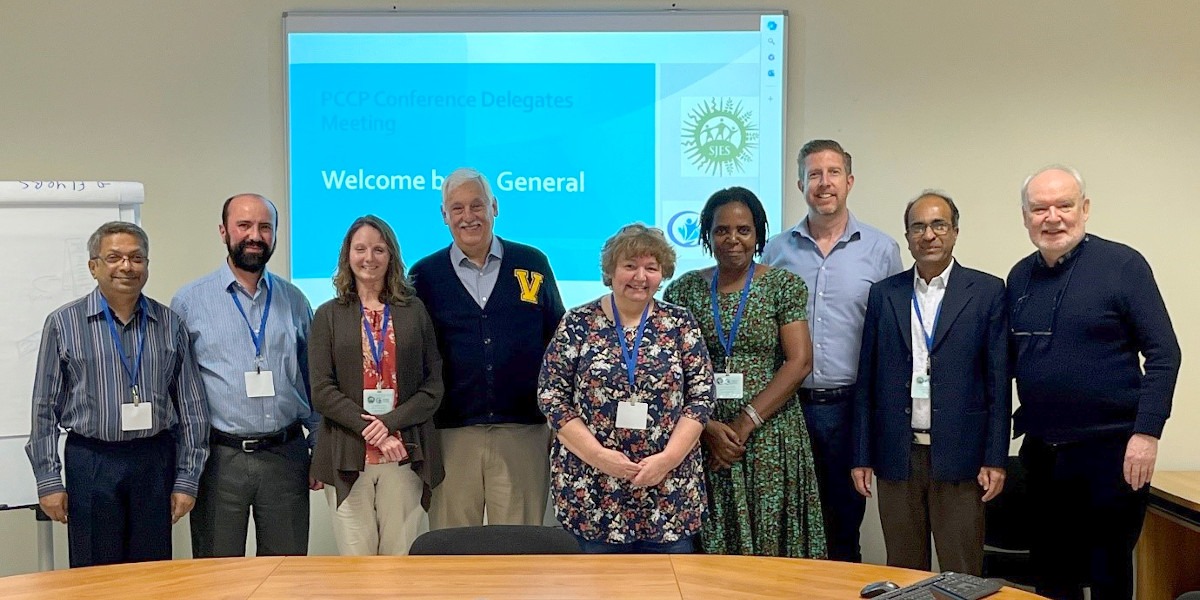
Fr General Arturo Sosa SJ (fourth from left) with JCAP’s Simon Davies (third from right) and safeguarding delegates from the Jesuit conferences of Africa and Madagascar, Canada and the US, Europe, Latin America, and South Asia
The new PCCP training and formation programme was the central agenda of the inaugural in-person meeting of the safeguarding delegates across all Jesuit conferences. Tasked with supporting the mission of the Promotion of a Consistent Culture of Protection (PCCP), the delegates are responsible for fostering networking and solidarity among the safeguarding delegates of each province, region, and mission within their respective conferences.
The formation and training programme was launched by Fr General Arturo Sosa SJ in December 2023, and it will unfold in the next three years in all apostolic areas of the Society, starting with pre-secondary and secondary education.
In his address to the safeguarding delegates gathered at the Jesuit curia in Rome from 11 to 14 March, Father General recalled the commitment of the Society of Jesus to eliminate abuse inside and outside the Church, as stated in the second Universal Apostolic Preference on Walking with the Excluded. He emphasised that the issue at hand is not isolated to any particular institution but a social problem that unfortunately affects the global community at large.
Father General stressed social impact as the main characteristic of the new training and formation programme led by Fr John Guiney SJ and Dr Sandra Racionero-Plaza. He appealed for active engagement and collaboration from all delegates for the programme’s effective implementation across the Society of Jesus. His message was both inspiring and profound, and will be key in keeping in mind the core goal of this new PCCP training phase: effecting social and cultural change.
Dr Racionero-Plaza, internationally recognised as the fourth ranked scientist in the area of safeguarding, responded to key emerging issues raised by the delegates by sharing the latest scientific research in social sciences and other relevant fields. She delved into topics such as adult-to-adult harassment, the latest conceptual developments on consent, communicative and non-communicative elements vital for ensuring consent in all interactions, and the centrality of community involvement within our institutions for effective response to and prevention of abuse. She emphasised the key role of upstanders and the importance of eliminating isolating violence against them, advocating evidence-based actions to achieve this objective.
Fr James Hanvey SJ, the Secretary for the Promotion of Faith, followed by sharing developments in the theology module of safeguarding, which will be standardised across all apostolic areas of the Society. The module integrates the Spiritual Exercises with the protection of the vulnerable and the healing of survivors. One of the most consoling moments of the meeting was identifying the profound dialogue and connections between scientific research and theology in their analyses and contributions to mitigate and prevent abuse. This integration is a groundbreaking characteristic of the new training and formation programme.
Fr Guiney and Dr Racionero-Plaza have already developed the architecture of the first phase of the programme. With the support of Educate Magis (EM), PCCP has adjusted the programme’s format to the already excellent EM platform. These developments were presented to the delegates, with a strong emphasis on the unique content characteristics that distinguish this programme on an international scale.
The programme is oriented towards social impact, setting it apart from being just another safeguarding programme, diploma, or course. Rather, it seeks a change in culture towards a more protective, caring, and respectful environment. For this social impact to happen, the programme leverages scientific evidence, equipping participants with specific tools that have been proven effective in promoting a consistent culture of protection. This knowledge will be brought into dialogue with Ignatian Spirituality, enriching the whole approach.
For the case of Jesuit and Ignatian schools, which encompasses the works of Fe y Alegría, Jesuit Refugee Service, and the Xavier Network, the curriculum will incorporate successful safeguarding practices that are already protecting and saving lives in schools in very diverse contexts and cultures. The safeguarding delegates are expected to continue their conversations with education representatives and others in their respective conferences to suggest technical and cultural details for the programme’s successful implementation.
The delegates also had the opportunity to listen to Fr Mark Ravizza SJ, Delegate for Formation, who presented the history of safeguarding formation of Jesuits. He underscored the pressing need for progress and the development of a comprehensive curriculum for all stages of Jesuit formation, supported by recent data.
Dr Racionero-Plaza and Fr Guiney presented the initial developments of the curriculum for Jesuit formation, which responds to such need. This curriculum shares the same principles of dialogue between scientific evidence and theology, orientation to social impact, and emphasis on the community dimension of positive human development and socialisation. There was great excitement among the delegates to see this advancement in Jesuit formation.
The meeting also included input from the areas of canon law and communication, both key areas in addressing allegations and complaints. Fr Benoit Malvaux SJ, the Procurator General, shared important updates in canon law pertaining to safeguarding, particularly regarding the protection of adults and the role of laypersons in breaking the silence. Additionally, Fr John Dardis SJ, General Counsellor for Discernment and Apostolic Planning and Director of Communications, offered communication guidelines for navigating cases of abuse.
Given the connections of PCCP with the role of women in the Society of Jesus, there was also an opportunity to hear from Fr Victor Assouad SJ, President of the Women’s Commission, about the work of the commission and possibilities of collaboration.
Fr Roberto Jaramillo SJ, the Secretary of the Social Justice and Ecology Secretariat (SJES), and his team were extremely supportive in the organisation of the meeting. Fr Jaramillo spoke of the work of SJES and underlined the integral connection between safeguarding and social justice. He stressed the importance of ensuring that the most vulnerable individuals and those marginalised in society remain at the centre of our concerns and planning processes. This perspective underscores the broader mission of the Society of Jesus in advocating for justice and reconciliation for all.
Related story: Society of Jesus launches comprehensive safeguarding training programme







